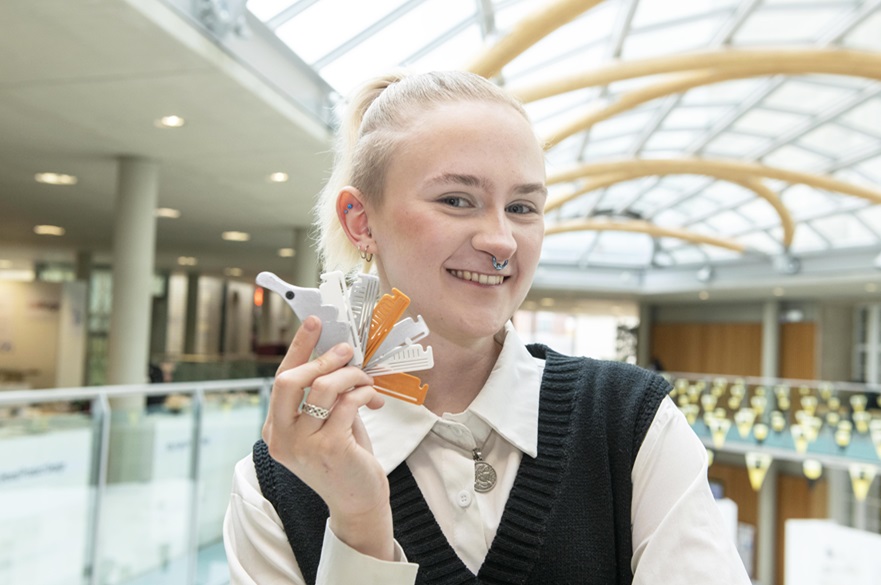Student with hair pulling condition creates device to help others
A student who has trichotillomania – a condition which makes someone compulsively pull out their own hair – has created a pocket-sized device to help other people manage the condition.
By Chris Birkle | Published on 20 June 2024
Categories: Press office; School of Architecture, Design and the Built Environment;

A student who has trichotillomania – a condition which makes someone compulsively pull out their own hair – has created a pocket-sized device to help other people manage the condition.
Eve Tollett, 22, created ‘Hands Off’ to support people who suffer from obsessive nail biting, lip biting, hair pulling and more, by providing them with a psychological competing behaviour.
The design – which is disguised as a Swiss Army Knife to avoid drawing attention to it - aims to provide a distraction for a person’s hands and brain.
In place of the blades are a variety of interchangeable ‘tiles’ which the consumer chooses to his or her tactile preferences, and which flick out when needed to help them manage their condition.
The product is disguised as a Swiss Army Knife, rather than appear to be a standard fidget toy, to avoid drawing unwanted attention to the user’s behaviour which they may feel personally conscious of.
Eve’s design was on show for the 2024 Nottingham Trent University (NTU) Student Showcase, which took place at the City Campus this summer.
The Showcase is one of the UK’s largest displays of graduating art and design talent with hundreds of student works going on public display.
“I’ve had this condition since childhood and when I was younger I used to rip my hair out in chunks,” said Eve, from Rodley, who is studying BA Product Design in the School of Architecture, Design and the Built Environment.
“Now I just find myself twiddling with my hair more than anything, but then occasionally notice a small pile of hair next to me on the floor.
“So I wanted to use my final year project to develop something which would help other people who suffer from a range of similar things.

“Trichotillomania is such a niche and under researched topic. A lot of the behaviours relate to stress, anxiety and nerves, so I thought it would be useful to develop a bespoke self-soothing tool which people can tailor to their needs.
“Because of the stigma against compulsive behaviours, I wanted the tool to look like anything but a general fidget toy to avoid people feeling self-conscious.”
Eve’s research involved surveying more than 100 people with similar conditions, which was an enlightening process that she says made her “feel less alone”.
She chose her final design to take a ‘thumbs-up’ shape to reinforce positive body language and which is universal sign for acceptance.
Made from aluminium, Hands Off can accommodate up to five tiles and weighs roughly the same as the average Swiss Army Knife.
The consumer orders their preferred tiles and constructs the product themselves at home. It features a loop so it can be used as a keyring.
The bespoke tiles are made from a variety of materials including wood, plastic and metal. They incorporate other materials such as string, yarn and more to provide a variety of tactile surfaces.
There are also a range of tiles with sliding mechanisms, magnets, snap backs, friction and bumps. New tiles are available for people to buy as their needs evolve.
Eve thinks that the starter product could be sold for up to £30 on the open market.
“Unlike regular fidget toys, this is a very personal product that’s unique to you,” says Eve. “One size doesn’t fit all, so it’s important that people can create something which is unique to them.”
James Dale, Head of Product Design at NTU, said: “Eve has taken her personal insight into a little known about condition and used it to create a product which has the potential to help many others.
“Her prototype proves how this product would work in reality and help people manage a variety of behaviours in a discreet and personal way.”
Notes for Editors
Press enquiries please contact Chris Birkle, Public Relations Manager, on telephone +44 (0)115 848 2310, or via email.
Nottingham Trent University (NTU) received the Queen’s Anniversary Prize for Higher and Further Education in 2021 for cultural heritage science research. It is the second time that NTU has been bestowed the honour of receiving a Queen’s Anniversary Prize for its research, the first being in 2015 for leading-edge research on the safety and security of global citizens.
The Research Excellence Framework (2021) classed 83% of NTU’s research activity as either world-leading or internationally excellent. 86% of NTU’s research impact was assessed to be either world-leading or internationally excellent.
NTU was awarded The Times and The Sunday Times Modern University of the Year 2023 and ranked second best university in the UK in the Uni Compare Top 100 rankings (2021/2022). It was awarded Outstanding Support for Students 2020 (Times Higher Education Awards), University of the Year 2019 (Guardian University Awards, UK Social Mobility Awards), Modern University of the Year 2018 (Times and Sunday Times Good University Guide) and University of the Year 2017 (Times Higher Education Awards).
NTU is the 5th largest UK institution by student numbers, with approximately 40,000 students and more than 4,400 staff located across five campuses. It has an international student population of 7,000 and an NTU community representing over 160 countries.
Since 2000, NTU has invested £570 million in tools, technology, buildings and facilities.
NTU is in the UK’s top 10 for number of applications and ranked first for accepted offers (2021 UCAS UG acceptance data). It is also among the UK’s top five recruiters of students from disadvantaged backgrounds and was the first UK university to sign the Social Mobility Pledge.
NTU is ranked 2nd most sustainable university in the world in the 2022 UI Green Metric University World Rankings (out of more than 900 participating universities).